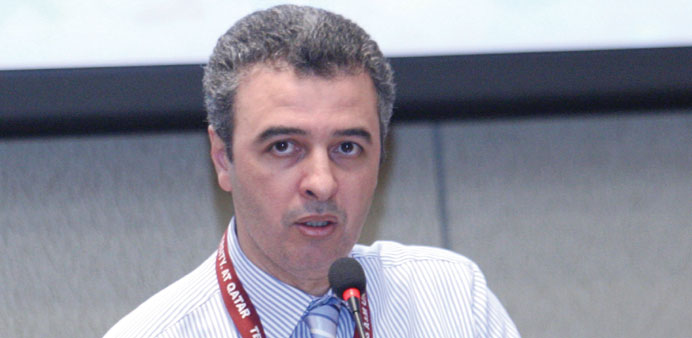|
|
Qatar could become an associate member of the European Organisation for Nuclear Research (CERN) in two years, an official of Texas A& M University at Qatar (TAMUQ) told Gulf Times yesterday.
“It is the right time for Qatar to look ahead,” Dr Othmane Bouhali, research associate professor and director of research computing at TAMUQ, stated.
He was speaking on the sidelines of a workshop, “Qatar: path to the world’s energy frontier”, held at Hamad Bin Khalifa University’s Student Centre yesterday.
“It is the right time as we have a momentum in research in Qatar. The visiting professors from CERN are here to understand and appreciate the research initiatives in Qatar and help us provide with the means to join the organisation,” he said.
According to Dr Bouhali, forming a consortium of different organisations was the first step towards the goal of joining CERN.
“The most important thing is to have a consortium and speak on behalf of Qatar. We are looking towards institutions such as Hamad Bin Khalifa University (HBKU), Texas A&M University at Qatar and Qatar University. Qatar Environment & Energy Research Institute is also likely to become a part of the consortium if it is materialised.”
The official stressed that if all the organisations worked hard, the formalities could be completed within one to two years and Qatar could then become an associate member of CERN.
He cited the example of Thailand which became an associate member of CERN in 2012. “Thailand initiated the efforts in 2010 and became an associate member in 2012,” he said.
Dr Abdul Sattar al-Taie, executive director of Qatar National Research Fund (QNRF), said efforts for the formation of a consortium and joining CERN were in the preliminary stages of discussion.
“I hope the efforts will get materialised soon and it will be a very good thing to join the CERN. One of the QNRF-funded projects was discussed at CERN in 2012,” he said, adding that Qatar lacked human capacity as well as basic programmes in physics.
“We are trying to address these issues in many ways.”
Dr al-Taie explained that QNRF had several programmes to support research proposals. “We have an exceptional proposal programme for which we award $5mn each. We have funded three such programmes so far,” he said.
Addressing the workshop, Alexi Safonov from Texas A&M University, said Qatar needed to set up a graduate school in physics and roll out an undergraduate programme in physics to overcome challenges in the area. Page 9
Leading centre for research
CERN, the European Organisation for Nuclear Research (Organisation européenne pour la recherche nucléaire), is one of the world’s largest and most respected centres for scientific research. Its business is fundamental physics, finding out what the universe is made of and how it works.

